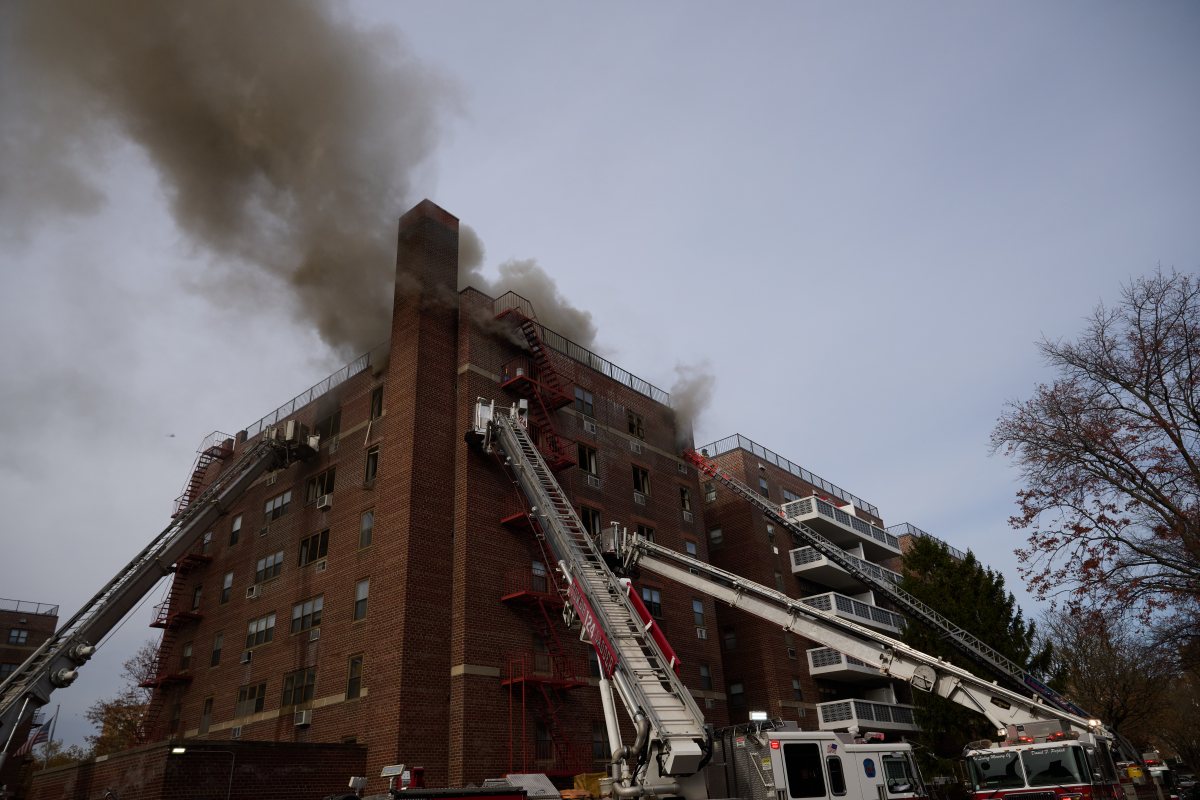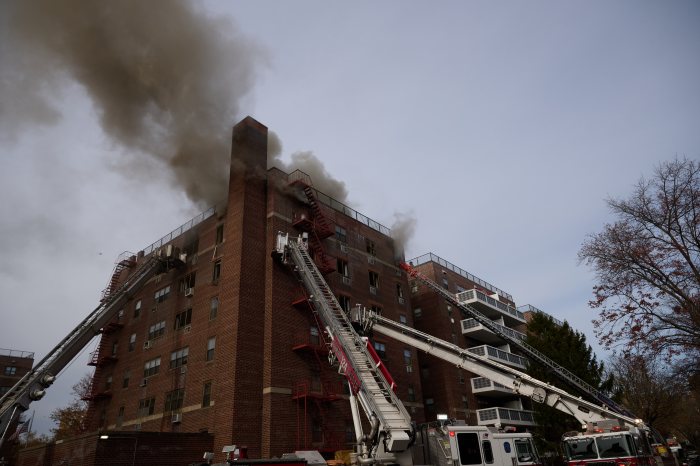Comeback kids quest for victory, redemption
REVIEWS BY SCOTT STIFFLER
KLITSCHKO
Documentary. 112 minutes.
Directed by Sebastian Dehnhardt.
In German, English, Ukrainian (with English subtitles).
Screening on Thurs., Apr. 28, 2:30pm, at AMC Loews Village 7 (66 Third Ave. at 11th St.); and Sat., Apr. 30, 10pm, at Tribeca Cinemas (54 Varick St. at Laight.).
For tickets ($16 evenings/weekends; $8 matinees), purchase at the Box Office or call 646-502-5296 or visit www.tribecafilm.com.
When two six-foot-six Ukrainian boxers talk (and win, then lose and then win), people listen — even if they have to read subtitles.
That these boxers happen to be brothers (Vitali and Wladimir Klitschko) who train like madmen, overcome injuries and become the first sibs to hold world titles at the same time makes for an unexpectedly warm and fuzzy 112 minutes. Heartstrings get pulled even tighter when they declare their boundless love for mom and promise to never fight each other no matter how much money is dangled in front of them. It also doesn’t hurt that these introspective, hulking giants — who hurt people for a living — grew up floating their little toy boats in the toxic puddles of Chernobyl drainage water and practicing kickboxing in secret because it was forbidden by the state
Director Sebastian Dehnhardt has made an entertaining, often inspiring documentary that accentuates the positive (not that there’s anything wrong with that). And yes, there are faults and flaws on display here — but as the clock ticks, you become more and more aware that this backstage glimpse isn’t the warts and all version it could have been. Maybe that was the price paid for such unfettered access to the Klitschko camp as well as an impressive roster of genuinely insightful talking heads (including Shannon Briggs, Lamon Brewster and Lennox Lewis — displaying great sportsmanship by praising the brothers, as we see footage of these three opponents getting pummeled).
It’s not just an overall lack of transparency on the part of Vitali and Wladimir that nags at you. Former fighter Shawn Raysor (who has a 53-7 amateur record and currently trains 13-1 pro heavyweight and two-time NYC Golden Gloves winner Tor Hamer) found it curious that the documentary pays very little attention to the Klitschkos’ early work in Germany (and a notable Olympic victory). There is, however, a good amount of bitter bellyaching from German promoters who lost their golden boys after the duo went pro and set their eyes on America.
That said, even the most informed boxing fan will have a hard time disliking this film. Raysor (who knows more about the Klitschkos than you’ll see on the screen) notes, “They told the truth — the basics of it. People who follow their career are going to like this film because it’s got two comeback stories. There was a time when neither brother had a title. That’s a humbling experience. It’s like what Lennox Lewis said about boxing being the most humbling of sports. You fight alone. But when a fighter loses, it doesn’t just destroy his ego. Everyone loses — his family, his friends, his trainer. Everyone.” It’s that sense of risk that makes this film worth seeing.
LIKE WATER
Documentary. 74 minutes.
Directed by Pablo Croce.
In English, Portuguese (with English subtitles).
Screening on Thurs., Apr. 28, 1:30pm, at Clearview Cinemas Chelsea (260 W. 23rd St., btw. 7th/8th Aves); and Sat., Apr. 30, 9pm at Tribeca Cinemas (54 Varick St. at Laight). For ticket info, see the “Klitschko” listing on this page.
Whether it’s boxing, Mixed Martial Arts or professional wrestling, having clearly defined heroes and villains is what puts asses in the seats — and keeps their owners from using those seats because they’re on their toes jockeying for a clear sight line and screaming themselves hoarse.
The old dependable fight between good and evil (plus the trash talk leading up to it) is what makes this look at Ultimate Fighter Anderson Silva snap like the unmistakable sound generated from a gloved punch landing on the sweet spot of your trainer’s hand pad. How else do you account for the sense of anticipation one feels when watching the countdown to a fight whose outcome is already ancient history?
Still, there’s an enormous amount of fun to be had (by fans and general audiences alike) by becoming a witness to the history of humble, guarded (and therefore enigmatic) Silva. When he refuses to take the bait and just trains relentlessly for a career-defining bout against a formidable opponent who’s defaming his skills and character to anyone who’ll listen, that borderline pacifist action transforms Silva into a classic underdog. It also helps that the documentary begins with footage from a fight many felt was an easy win. UFC head honcho Dana White (in cynical but savvy black hat mode) transforms from Silva booster to the guy who loudly declares his latest performance a personal embarrassment.
It’s not exactly a spoiler to note that at the Q&A session following the April 23 screening, a fan referred to what transpired during a shared moment with his opponent immediately following the fight that “Like Water” is built around. “When you embraced,” asked the audience member, “did he say anything respectful?” Displaying a comic’s wry timing, Silva deadpanned, “He told me he loved me. But I didn’t believe it.”





































